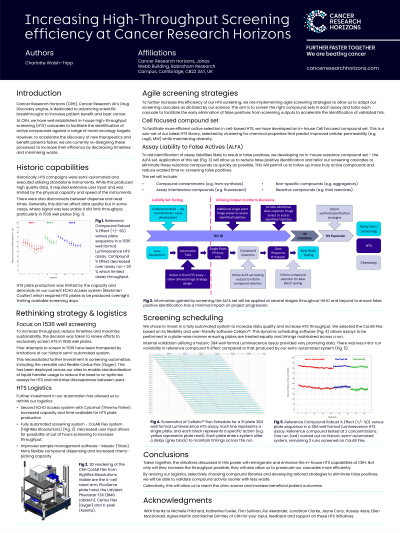Frontiers in Technology
Poster Session A
(1136-A) Increasing High-throughput Screening efficiency at Cancer Research Horizons
Tuesday, May 28, 2024
16:30 - 17:15 CEST
Location: Exhibit Hall

- CW
Charlotte Walsh-Tripp
Dr
Cancer Research Horizons
CAMBRIDGE, England, United Kingdom
Poster Presenter(s)
Abstract: Cancer Research Horizons (CRH), Cancer Research UK’s Drug Discovery engine, is dedicated to advancing scientific breakthroughs to increase patient benefit.
At CRH, we have well established in-house high-throughput screening (HTS) cascades to facilitate the identification of active compounds against a range of novel oncology targets. However, to accelerate the discovery of new therapeutics and benefit patients faster, we are currently re-designing these processes to increase their efficiency by decreasing timelines and minimising waste.
Historically, we employed a semi-automated screening approach and although this produced high quality data it required extensive user input and was limited by the capacity and speed of the instruments utilised. In particular, this approach was not well suited to screening HTS in a 1536 well format due to increased plate processing times.
Investment in both the automation hardware and software available in-house has allowed for more flexible screening logistics to be employed. We have increased both the throughput and redundancy of our compound handling automation coupled with improved software offerings allowing for increased cherry-picking capabilities in-house. Likewise, we have invested further in our screening automation through the purchase of a fully automated screening platform which has reduced user intervention and allowed for the possibility of overnight screening.
We have also renewed focus on exclusively screening our HTS assays in a 1536 well format to enable increased throughput. To facilitate this, we invested in a CoLAB Flex system from HighRes Biosolutions with its associated Cellario™ dynamic scheduling software. This allows the execution of screens in a stepwise plate-by-plate basis ensuring all plates in a run are treated equally. Comparisons with our semi-automated screening system produced less variable screening data. Modifications have been made to our assay development processes with a greater focus on automated liquid handling to allow introduction of the 1536 well format earlier and easier transitions into HTS.
Alongside this drive for increased assay throughput, we are adopting agile screening strategies to identify validated compounds more efficiently from our HTS. For cell-based assays, we have developed and in-house Cell Focused set from our existing libraries with the aim of screening compounds with a higher likelihood of permeating cells in these assays. We are likewise developing an Assay Liability to False Actives (ALFA) set of nuisance compounds to aid in the identification of screening assay liabilities. Utilising this set should allow the prediction of which classes of false positives we’re likely to identify in our screens so we can tailor our triage strategies appropriately to efficiently eliminate them.
At CRH, we have well established in-house high-throughput screening (HTS) cascades to facilitate the identification of active compounds against a range of novel oncology targets. However, to accelerate the discovery of new therapeutics and benefit patients faster, we are currently re-designing these processes to increase their efficiency by decreasing timelines and minimising waste.
Historically, we employed a semi-automated screening approach and although this produced high quality data it required extensive user input and was limited by the capacity and speed of the instruments utilised. In particular, this approach was not well suited to screening HTS in a 1536 well format due to increased plate processing times.
Investment in both the automation hardware and software available in-house has allowed for more flexible screening logistics to be employed. We have increased both the throughput and redundancy of our compound handling automation coupled with improved software offerings allowing for increased cherry-picking capabilities in-house. Likewise, we have invested further in our screening automation through the purchase of a fully automated screening platform which has reduced user intervention and allowed for the possibility of overnight screening.
We have also renewed focus on exclusively screening our HTS assays in a 1536 well format to enable increased throughput. To facilitate this, we invested in a CoLAB Flex system from HighRes Biosolutions with its associated Cellario™ dynamic scheduling software. This allows the execution of screens in a stepwise plate-by-plate basis ensuring all plates in a run are treated equally. Comparisons with our semi-automated screening system produced less variable screening data. Modifications have been made to our assay development processes with a greater focus on automated liquid handling to allow introduction of the 1536 well format earlier and easier transitions into HTS.
Alongside this drive for increased assay throughput, we are adopting agile screening strategies to identify validated compounds more efficiently from our HTS. For cell-based assays, we have developed and in-house Cell Focused set from our existing libraries with the aim of screening compounds with a higher likelihood of permeating cells in these assays. We are likewise developing an Assay Liability to False Actives (ALFA) set of nuisance compounds to aid in the identification of screening assay liabilities. Utilising this set should allow the prediction of which classes of false positives we’re likely to identify in our screens so we can tailor our triage strategies appropriately to efficiently eliminate them.
